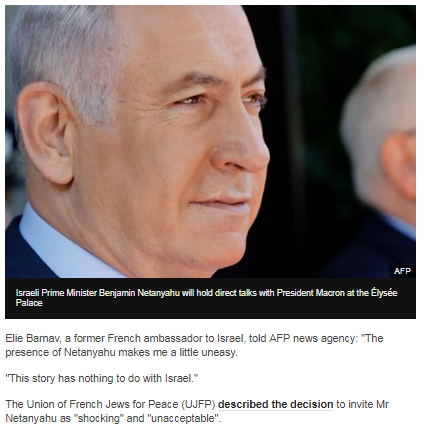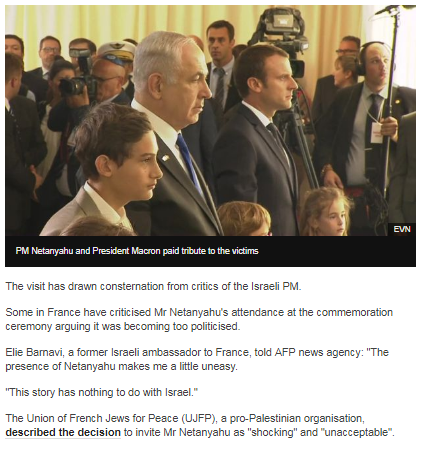On July 16th an article titled “Netanyahu in Paris to commemorate Vel d’Hiv deportation of Jews” appeared on the BBC News website’s Europe and Middle East pages. However, the version of that report which is currently available is markedly different from its earlier editions.
The article originally opened as follows:
“Israeli Prime Minister Benjamin Netanyahu is in Paris to commemorate the victims of a mass arrest of Jews in Nazi-occupied France in 1942.
More than 13,000 Jews were rounded up and detained at a cycling stadium, the Velodrome d’Hiver, before being deported to Nazi death camps.
Mr Netanyahu will also hold direct talks for the first time with French President Emmanuel Macron.
The visit has been criticised by some groups as politicising a tragedy.” [emphasis added]
About an hour after publication, that latter sentence was amended to read:
“The visit has drawn consternation from critics of the Israeli PM.”
BBC website visitors who read the article’s first two versions were later told that:
“Mr Netanyahu’s attendance at the commemoration ceremony has not been welcomed by everyone in France.”
That statement was replaced in version 3 by the following:
“The visit has drawn consternation from critics of the Israeli PM.
Some in France have criticised Mr Netanyahu’s attendance at the commemoration ceremony arguing it was becoming too politicised.”
Readers of the first three versions of the report were next informed that:
“Elie Barnav, a former French ambassador to Israel, told AFP news agency: “The presence of Netanyahu makes me a little uneasy.
“This story has nothing to do with Israel.””
Obviously the BBC did not copy/paste the AFP report it recycled properly because the person concerned is actually called Elie Barnavi rather than ‘Barnav’.
Clearly too, the BBC did not bother to check the original AFP article in French because had it done so, it would know that Mr Barnavi is in fact “l’ancien ambassadeur d’Israël en France” – the former Israeli ambassador to France – (2000 to 2002) rather than “a former French ambassador to Israel” as was inaccurately claimed in the English language version of that AFP report.
As regular readers know, the BBC’s editorial guidelines on impartiality state that:
“We should not automatically assume that contributors from other organisations (such as academics, journalists, researchers and representatives of charities) are unbiased and we may need to make it clear to the audience when contributors are associated with a particular viewpoint, if it is not apparent from their contribution or from the context in which their contribution is made.”
It would therefore have been appropriate for readers to have been informed of Mr Barnavi’s links to political groups of a particular stripe – which are far more relevant in the context of his comments than his time spent in the diplomatic service.
“Within months of being sent off to Paris by Prime Minister Ehud Barak, he found himself with a new boss: Ariel Sharon. Barnavi, a Peace Now activist, wondered what to do. Many French Jews expected him to resign.”
Similarly, when the BBC decided to promote the view of a tiny fringe French group also quoted in the AFP article (including a link to its website) it should have clarified to readers that UJFP supports the anti-Israel BDS campaign.
“The Union of French Jews for Peace (UJFP) described the decision to invite Mr Netanyahu as “shocking” and “unacceptable”.”
BBC Watch contacted the BBC News website raising those issues and subsequently the article was amended yet again to correct the inaccurate reporting of Mr Barnavi’s name and former position. The tepid and unhelpful description “a pro-Palestinian organisation” was added to the sentence promoting the UJFP.

No footnote was added to advise BBC audiences who had read the earlier versions of the report of the inaccuracies in its first three editions.
Obviously the BBC was far more concerned with amplifying politically motivated criticism of the Israeli prime minister’s Paris visit (at the invitation of the French president: a point strangely absent from the BBC’s account of the story) than it was in ensuring that audiences were provided with accurate and impartial information.
Eventually – some six and a half hours after its original appearance – the article was amended once again and the sections amplifying politically motivated criticism of the Israeli PM’s participation in the ceremony that was its subject matter were completely removed.
Related Articles:




